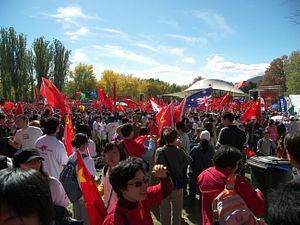The Beatles knew it 55 years ago; and China is finding out the hard way: money still can’t buy you love. At least not for long.
The results of the 2019 Lowy Institute poll, out today, indicate the Australian public has soured on China considerably in the past year. Australia’s largest trading partner dropped 9 degrees to 49 on the annual “feelings thermometer,” which measures public warmth toward other countries on a scale of 0-100. That’s the steepest drop in sentiment and the lowest result China has recorded in 15 years of the poll. It started at a warm 69 in 2005.
A similar cooling off is reflected in other poll results, suggesting something broader is going on. Trust in China to act responsibly in the world plummeted 20 points from 52 percent last year to 32 percent in 2019. Ten years ago, almost twice as many Australians (59 percent) trusted China to act responsibly.
Only 30 percent of Australians have confidence in China’s President Xi Jinping to do the right thing regarding world affairs (down from 43 percent last year). Notably, Australians still have more confidence in Xi than they do in U.S. President Donald Trump (25 percent this year, down from 30 percent in 2018).
But the Australian embrace of the United States is more resilient, despite Trump’s best efforts. The U.S. sits at 63 degrees on the thermometer, 14 degrees warmer than China. Australians’ trust in the United States to act responsibly in the world, even with the decidedly unpopular Trump at the helm, was still considerably higher than China at 52 percent this year (it was 55 percent in 2018 and reached 83 percent in 2011 under President Obama).
Other polls have detected a recent decline in sentiment toward China. In 2018 Pew Research found American attitudes to China grew less positive, down 6 points to just 38 percent holding a favorable view in 2018. Gallup likewise recorded a steep uptick in Americans holding an unfavorable view of China, up 12 points to 57 percent in 2019. Public sentiment on China in the countries Pew surveys (except Russia, Tunisia, and Kenya) has been on a downhill slide since Xi Jinping came to power. Under Xi, the world has seen China militarize reefs and rocks in contested waters in the South China Sea and watched with alarm its arms build-up, crackdowns on Chinese civil society, and forced disappearances of critics of the Chinese Communist Party.
There’s evidence, though, that Trump’s presidency is narrowing the great power popularity gap.
For years the Australian public stayed notably warm toward China, in the long afterglow of the mining boom, with sentiment around 58 degrees on the Lowy poll thermometer for the five years to 2018. This embrace survived even a few years of tough talk from security agencies about Chinese cyberattacks and a political interference scandal. So why did 2018 see such a sharp downturn?
Perhaps Australians needed a while for it all to sink in. China’s tightening authoritarianism has provided no shortage of unpopular material. Last year alone saw revelations of China’s mass internment of Uyghurs in Xinjiang, the arbitrary imprisonment of two Canadians, and the disappearance of a top Chinese security official who had been running Interpol.
Perhaps above all, the shock removal of presidential term limits in March 2018, effectively making Xi Jinping China’s ruler for life, quashed any lingering hopes for a more institutionalized government system in China.
Some will say that image doesn’t matter, that China is rich and powerful enough to do and get what it wants anyway. But over the past decade, China’s leadership has explicitly made boosting soft power a core national mission, evidently deciding it is a lot easier to get your way when people like you rather than fear you.
U.S. sinologist David Shambaugh of George Washington University estimates China spends approximately $10 billion a year on efforts to enhance its image. That includes everything from funding Confucius Institutes overseas to educational exchanges in China; “research trips” for foreign media and business elites; partnerships with Hollywood production houses; cultural diplomacy among Chinese diasporas; extending the reach of the national broadcaster and news agency; and panda visits for foreign zoos.
Recognizing correctly that Chinese culture, food, and pandas offer an appealing package, Beijing nonetheless missed the point: party-state co-optation and utilization of culture, hamstrung and censored by CCP politics, is counterproductive.
China’s human rights record, its systems of digital authoritarianism and ham-fisted efforts to control the China story worldwide by silencing overseas critics and renting friends are kryptonite to soft power efforts. You can’t trust much told to you by a government that covers up public health and food safety scandals while forbidding the free exchange of ideas and criticism of its own actions.
China’s best story is one the government doesn’t even have to tell – its economic one. Most of the world genuinely admires the country’s reforms, which allowed some 800 million people to lift themselves out of poverty in the past few decades. But it seems even that is no longer cutting through the constant flow of reputational damage from Beijing’s own decisions.
The big question is what happens when Beijing decides its huge investment in soft power has failed. Does Beijing learn from its mistakes, retreat from its most unpopular policies? Or does it decide if it can’t have love, fear will do?Kelsey Munro is a Research Fellow and Podcast Director at the Lowy Institute. The Lowy Institute’s Annual Poll was released on June 26.
































